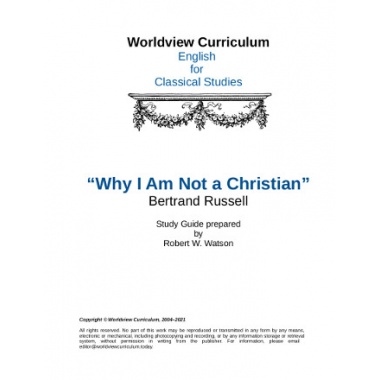"Why I Am Not a Christian"
The essay is included with the study guide. Guide prepared by Robert W. Watson. Download file: Pub88.zip.
$0.00
LIVING for ninety-seven years, Bertrand Russell lived a
long and controversial life. His search for knowledge established Russell as a pioneer in both the fields of
mathematics and of philosophy. If his activism against war and nuclear
weapons is an indication of his “unbearable pity for the suffering of mankind,”
then Russell surely put feet to his words.
During World War I, Russell was dismissed from Trinity College and later imprisoned for five months because of his anti-war activities in Great Britain. Many years later in 1961, Russell spent a week in prison again for his role in anti-nuclear protests. Trying several times to capture a seat in parliament, Russell was defeated every time he ran a campaign.
When his brother died in 1931, Russell became the third Earl Russell and a few years later was offered a professorship of philosophy at the University of California at Los Angeles. One year later, Russell was given an appointment at City College in New York, but he was determined by a court to be morally unfit to be a professor at the school, largely because of his views found in his book, Marriage and Morals.
Russell was a prolific writer, and he was recognized for his contribution to literature by being awarded the Noble Prize for Literature in 1950. Nevertheless, Russell is best known for his work in mathematics, particularly concerning set theory and for his being one of the founders of analytical philosophy, a short lived project trying to bring clarity to language. Philosophically, Russell embraced neutral monism, a belief that there is only one substance that composes everything, both thoughts and physical reality. But most Christians know Russell by his lecture, “Why I Am Not a Christian,” presented in 1927 and printed in a book of religious essays in 1957. As a self-proclaimed atheist, Russell espouses, as you will read, the lowest opinion of religion of any man.
There have been many fine refutations of Russell’s essay. In fact, Russell and his thinking are easy marks to hit. Overall, the essay is disappointing, because it is so shallow, which one would not expect from such an otherwise brilliant thinker. However, Russell time and time again proves the Bible and its pronouncements about the foolishness of men not being led by the Spirit of God. Indeed, while professing himself to be wise, Russell appears foolsh and silly. His audience is the National Secular Society, a friendly gathering, and Russell has the role of being more like a cheerleader at a pep rally than like a philosopher trying to formulate a better system than Christianity. Ironically, in his essay, Russell is guilty of dogmatism and emotionalism, which he claims to be undesirable traits of the Christian faith.
Russell attacks Christianity from two fronts: the non-existence of God and the low moral character of the Lord Jesus Christ. If he is successful with either assertion, then Russell will have carried his burden of proof, and Christianity should indeed be called into question. Whether he is successful is left up to your judgment.
During World War I, Russell was dismissed from Trinity College and later imprisoned for five months because of his anti-war activities in Great Britain. Many years later in 1961, Russell spent a week in prison again for his role in anti-nuclear protests. Trying several times to capture a seat in parliament, Russell was defeated every time he ran a campaign.
When his brother died in 1931, Russell became the third Earl Russell and a few years later was offered a professorship of philosophy at the University of California at Los Angeles. One year later, Russell was given an appointment at City College in New York, but he was determined by a court to be morally unfit to be a professor at the school, largely because of his views found in his book, Marriage and Morals.
Russell was a prolific writer, and he was recognized for his contribution to literature by being awarded the Noble Prize for Literature in 1950. Nevertheless, Russell is best known for his work in mathematics, particularly concerning set theory and for his being one of the founders of analytical philosophy, a short lived project trying to bring clarity to language. Philosophically, Russell embraced neutral monism, a belief that there is only one substance that composes everything, both thoughts and physical reality. But most Christians know Russell by his lecture, “Why I Am Not a Christian,” presented in 1927 and printed in a book of religious essays in 1957. As a self-proclaimed atheist, Russell espouses, as you will read, the lowest opinion of religion of any man.
There have been many fine refutations of Russell’s essay. In fact, Russell and his thinking are easy marks to hit. Overall, the essay is disappointing, because it is so shallow, which one would not expect from such an otherwise brilliant thinker. However, Russell time and time again proves the Bible and its pronouncements about the foolishness of men not being led by the Spirit of God. Indeed, while professing himself to be wise, Russell appears foolsh and silly. His audience is the National Secular Society, a friendly gathering, and Russell has the role of being more like a cheerleader at a pep rally than like a philosopher trying to formulate a better system than Christianity. Ironically, in his essay, Russell is guilty of dogmatism and emotionalism, which he claims to be undesirable traits of the Christian faith.
Russell attacks Christianity from two fronts: the non-existence of God and the low moral character of the Lord Jesus Christ. If he is successful with either assertion, then Russell will have carried his burden of proof, and Christianity should indeed be called into question. Whether he is successful is left up to your judgment.

